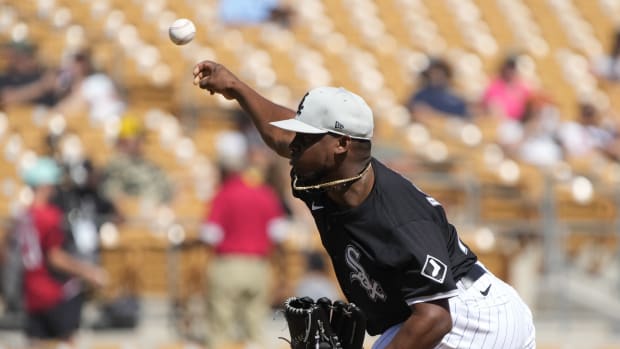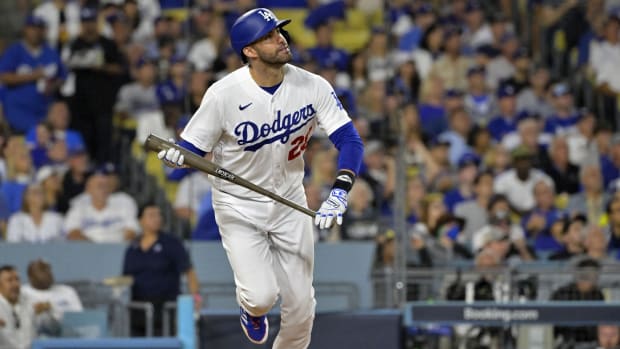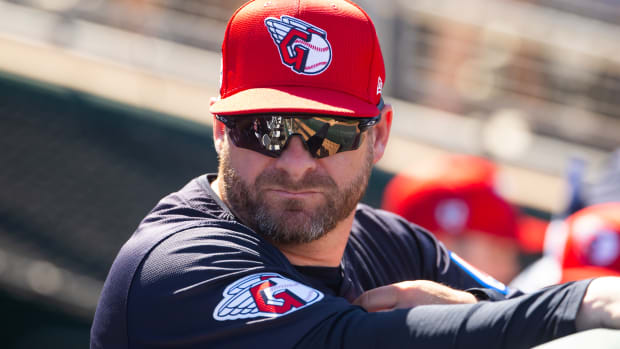The Simple Joys of Baseball's Return to American Television
It rained, because of course it did.
At 1 a.m. Eastern on Tuesday—some five weeks after what should have been Opening Day for MLB, which is to say some seven weeks after the fabric of daily life unraveled entirely—ESPN went live to its first broadcast of the Korea Baseball Organization. Here was Opening Day, with the NC Dinos set to play the Samsung Lions, and the field was under a tarp. A rain delay: A previously familiar inconvenience, like getting cut off in traffic, or uncomfortably stuck at a crowded bar, or boxed into bad small talk at a party. Just a routine frustration—pointless, with no ties to existential fears. A rain delay! How silly to care about. What a luxury.
It passed quickly. After half an hour, the clouds had moved out. And then, at last, live baseball was back on American television in 2020—in an empty stadium halfway around the world, and at an ungodly hour of the morning, but live baseball nonetheless. Which felt like a balm just as much as it stung.
It offered all of the usual material that makes baseball worthwhile. There were the essential sounds, cracks of bats and muffled thwacks in mitts. There were both home runs and replay reviews of home runs. There were runners trying to stretch singles into doubles; balls skied to the warning track in loose arcs; tightly turned defensive sequences and ambient field chatter and exaggerated strike calls. There was a box score. All of this has been available over the last few weeks in the lone other functional baseball association, the CPBL in Taiwan, whose games typically start around 6:30 a.m. ET and stream on Twitter. But here was more, aired live on national television, at an hour a bit more conducive to baseball. The rhythm was familiar—that smooth cadence, gentle and meandering, that makes it feel like a privilege to be awake so late. Here was everything that had been missed in the last month.
KBO is not MLB. But the differences between the two can be the basis for celebration rather than simply for comparison. You’ve probably heard about the bat flips. (The Dinos and Lions provided an excellent one on Tuesday.) That’s the most obvious distinction, but it isn’t the most substantive, or even the most intriguing. There’s a generally different brand of play—with more contact, a universal designated hitter, and an extra-inning structure that cuts off after the twelfth. There are incredible mascots. (If “Dinos” is somehow not enough to sell you on the team, please check out this disturbingly jacked guy, Dandi the Tyrannosaurus.) The KBO is a joy in its own right, to be appreciated on its own terms, rather than a substitute to turn to in lieu of other baseball. It’s a gift to have such easy access to it now.
And yet, amid all these small wonders on Tuesday, it was hard not to be aware of what it took for this to be on television at all. There was the empty stadium—a significant concession for a league traditionally known for its incredible fan culture. There was the broadcast’s reminder of new rules: no high-fives, no handshakes, no spitting (no spitting!). And there was the realization of how far the U.S. could be from producing any sort of similar situation for MLB. There is credible talk of spring training that could start in June for a season to start in July. But it’s still impossible to say what that will look like, or whether it will come at all, or what it will take to reach an environment where baseball seems not just logistically possible but generally reasonable. There are no answers. To watch sports elsewhere is a reminder of what could have been and will not be in the U.S.
But, of course, to watch sports elsewhere is to watch sports—not replays of old classics, or sports-adjacent documentaries, or competitive activities that vaguely resemble sports but are in fact marbles on sand. All of these can be enjoyable. (And, obviously, none more so than the marbles.) But the last six weeks have stretched these substitutes thin and made their limits obvious. They can feel like a good distraction, or fine entertainment, or, at minimum, a decent source of information. But sports? They’re all wrong. They miss too much.
They miss the ninth inning of Dinos-Lions—a brief stab at a comeback, a clumsy hope, a moment where the outcome was uncertain. And then a decisive answer in the form of a routine out, with a goodbye from the broadcast that doubled as a promise: There would be more tomorrow.


































